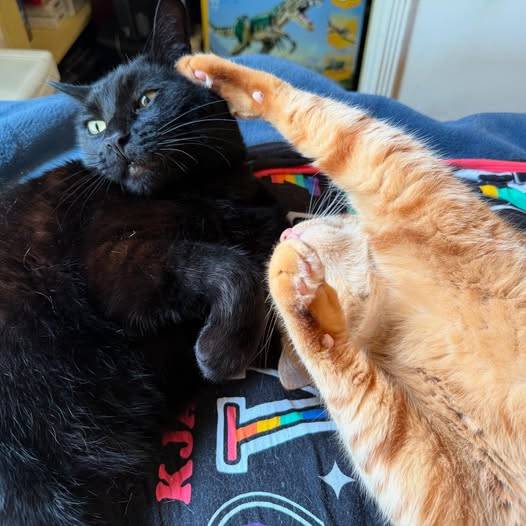( Read more... )
( Read more... )
morning gazette.
Is it OK to read Infinite Jest in public? Why the internet hates ‘performative reading’
You know, I was completely unaware that 'The Internet' hated upon this (whatever it is) until I came across this article and I think we are probably well into a realm similar to journo constructing a phenomenon on the basis of '6 people I spoke to in the wine-bar last week'.
Or maybe I just don't do TikTok and am missing this, but in my experience, few forms of social media are entire monoliths, what?
Why shouldn't people read in public? They're not doing it AT other people, honestly.
Can't help thinking that those who get aerated at people reading on public transport or while sitting quietly in a restaurant or coffee-shop are very likely those who think you should 'rawdog' long planeflights, sad gits.
Okay, these days I am pretty much always reading on ereader when out and about, so nobody can see what I'm reading. But back in the day I have read a lot of things that I daresay some miserable so-and-so would have considered 'performative', like Remembrance of Things Past on the Tube.
And among other things Marx and Rousseau on the train when I was commuting in from suburban Surrey.
Which phase of my life I was reminded of by a review headed 'A darker side of Lawrence Durrell' - I was not aware that there was any other side, actually - I habitually got in the same compartment of the same train each morning and there was the same young man making his way veeeeery slowwwwly through the volumes of The Alexandria Quartet. Months and months of Balthazar.

What I read
Finished The Islands of Sorrow and it is a bit slight, definitely one for the Simon Raven completist I would say - a number of the tales feel like outtakes from the later novels.
Decided not for me: Someone You Can Build a Nest In.
Started Val McDermid, The Grave Tattoo (2006), a non-series mystery. Alas, I was not grabbed - in terms of present-day people encounter Historical Mystery, this did not ping my buttons - a) could not quite believe that a woman studying at a somewhat grotty-sounding post-92 uni in an unglam part of London would have even considered doing a PhD on Wordsworth (do people anywhere even do this anymore) let alone be publishing a book on him b)a histmyst involving Daffodil Boy and a not so much entirely lost but *concealed unpublished in The Archives* manuscript of Epic Poem, cannot be doing with. (Suspect foul libel upon generations of archivists at Dove Cottage, just saying.) Gave up.
Read in anticipation of book group next week, Anthony Powell, The Kindly Ones (1962).
Margery Sharp, Britannia Mews (1946) (query, was there around then a subgenre of books doing Victoria to now via single person or family?). Not a top Sharp, and I am not sure whether she is doing an early instance of Ace Representation, or just a Stunning Example of Victorian Womanhood (who is, credit is due, no mimsy).
Because I discovered it was Quite A Long Time since I had last read it, Helen Wright, A Matter of Oaths (1988).
Also finished first book for essay review, v good.
Finally came down to a price I consider eligible, JD Robb, Bonded in Death (In Death #60) (2025). (We think there were points where she could have done with a Brit-picker.)
On the go
Barbara Hambly, Murder in the Trembling Lands (Benjamin January #21) (2025). (Am now earwormed by 'The Battle of New Orleans' which was in the pop charts in my youth.)
Up next
Very probably, Zen Cho, Behind Frenemy Lines, which I had forgotten was just about due.
***
O Peter Bradshaw, nevairr evairr change:
David Cronenberg’s new film is a contorted sphinx without a secret, an eroticised necrophiliac meditation on grief, longing and loss that returns this director to his now very familiar Ballardian fetishes.

Well, in further conferencing misadventures, woke up around 5 am with what I came to realise was a crashing migraine - it is so long since I have had one of these as opposed to 'headache from lying orkard' - took medication, and after some little while must have gone to sleep, because I woke up to discover it was nearly 9.30, and I had slept well past the alarm I had set in anticipation of the 9.00 first conference session. But feeling a lot better.
I was only just in time to grab some breakfast before they started clearing it up.
The day's papers were perhaps a bit less geared towards my own specific interests - and I was sorry to miss the ones I did - but still that there Dr ![]() oursin managed the occasional intervention. There were also some good conversations had.
oursin managed the occasional intervention. There were also some good conversations had.
So the conference, as a conference, was generally judged a success, if somewhat exhausting.
I managed to get the train from the University to Birmingham New Street with no great difficulty.
However, the train I was booked on was somewhat delayed (though not greatly, not cancelled, and no issues of taking buses as in various announcements) and I initially positioned myself at the wrong bit of the platform and had to scurry along through densely packed waiting passengers.
Journey okay, with free snacks, though onboard wifi somewhat recalcitrant.
At Euston, the taxi rank was closed!!!!
Fortunately one can usually grab a cab in the Euston Road very expeditious, and I did.
So I am now home and more or less unpacked.
Given that Mercury is, I recollect, the deity of travellers, is Mercury in retrograde?



For hedjog is going floppp.
Travel troubles today: being unable to see where the hell the alleged railway station near hotel was, and taking a taxi instead; railway out of order this evening, Ubers were summoned to take participants to hotel.
Yr hedjog was Living Bit of History in opening roundtable.
And in later sessions, there was a certain amount of That There Dr ![]() oursin going on in the questions/comments....
oursin going on in the questions/comments....
Some good conversation - even if hearing aids not too helpful in crowded rooms - but have noped out from evening meal, feeling too tired, will go for light meal here and early night (I hope).

Wot a saga, eh, wot a saga, first time I have ventured significantly forth these many years -
And to start with, MAJOR HEAT EVENT.
In anticipation, I had - or so I thought - prudently booked a taxi via taxiapp, with a certain amount of leeway, just in case -
- which turned out very prudent, as when I went to check the booking this morning the app was showing 'network error' and this was clearly on their end rather than mine, and a little looking about suggests that this is not their first rodeo server problem.
So when, at designated time, taxi cameth not, I set out towards the Tube, not without some hope that a black cab might pass me on my way, but that Was Not To Be -
And on reflection, I should perhaps have waited for a Bank train, because getting out on Charing X platforms at Euston involves rather too many stairs.
However, Avanti kindly texted me the approx time my train would be boarding, and this all seemed set - although my (1st class) seat was aisle, backwards, there was nobody in the other 3 seats so I switched -
HAH.
When we reached Coventry, choochoo sighed and gave up, and we had to debouch and take the next Birmingham bound train - which was delayed....
At Birmingham New Street had considerable faff trying to discover a Way Out that would take me to a taxi rank.
When I finally arrived at hotel booked by conference organisers there was an immense performance trying to find the right group booking, as it was not under any title that I might have thought of but that of some hireling booking agency.
However, I am now in nice cool room and have had tasty room service snack. Even if I have had to wrestle with getting my laptop to talk to the free wifi...

How is it the end of June already? Where did it go?
And tomorrow I have to travel to Birmingham for a conference.
I am telling myself that I survived the Hot Summer of 76 in an un-airconditioned office where, if one opened a window in came the noise and fumes of a heavily traffic-polluted thoroughfare.
Of course, I was Much Younger in those days.
I see that it is supposed to get somewhat cooler (and wetter) on Weds.

This year brought us Margaret Owen’s Holy Terrors. It’s the third in a trilogy about an angry, selfish girl named Vanja who made it through a lifetime of neglect and abuse with a crop of emotional and physical scars, a talent for picking pockets, the favor of the gods (sometimes), and a healthy hostility for rich people. Against both their better judgment, she falls in love with prefect Emeric Conrad, whom she variously describes as a “human civics primer,” an “accounting ledger made flesh,” and an “intolerable filing cabinet.”
(Here the author of this piece has been compelled to delete a ten thousand–word manifesto about the greatness of the Little Thieves series. If you like the TV show Leverage, or you enjoy digging your teeth into solid character development, or you just hate rich people, you should read it. The first book is Little Thieves. Thank me later.)
Last week's bread held out pretty well.
Friday night supper: ven pongal (South Indian khichchari).
Saturday breakfast rolls: the ones loosely based on James Beard's mother's raisin bread, 50:50% strong white/einkorn flour, perhaps a little lacking in the mace department.
Today's lunch: (this ran into several difficulties including oven problems and a pyrex plate going smash on the floor, but got there in the end) salmon fillets baked in foil with butter, salt, pepper and dill, served with baby Jersey Royal Potatoes boiled and tossed in butter, garlic-roasted tenderstem broccoli, and white-braised green beans with sliced baby red pepper.




But this is just plain bizarre: reading the AI summaries rather than watching the series or presumably, reading books.
What is even gained thereby?
It's so massively Point Thahr Misst about why one consumes story-telling that I can't even.
Why not just go straight to: this work manifests [whichever of the whatever the allegedly number it is of standard plots it is] tout court?
I guess these are the people that live on Soylent and pride themselves on 'rawdogging' airflights?
Have they completely eliminated enjoyment and fun from their lives, and if so, WHY????
Conversely, and in the interests of pleasure, there has recently opened a bookshop entirely dedicated to romance, in Notting Hill. (I do cringe a bit at calling it 'Saucy Books'.)
Back in the day, in Charing Cross Road, there used to be a dedicated Romance section alongside Murder One and the SFF section in the basement, all in one bookshop, but that has long been one with the dodo.
| Sun | Mon | Tue | Wed | Thu | Fri | Sat |
|---|---|---|---|---|---|---|
|
1
|
2
|
3
|
4
|
5
|
6
|
|
|
7
|
8
|
9
|
10
|
11
|
12
|
13
|
| 14 |
15
|
16
|
17
|
18
|
19
|
20
|
|
21
|
22
|
23
|
24
|
25
|
26
|
27
|
|
28
|
29
|
30
|
31
|